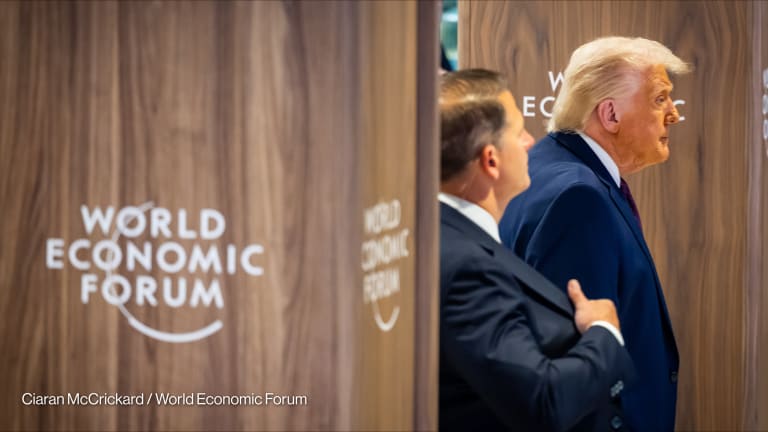A global development insider's guide to Davos
What can global development organizations get out of the expensive and hard-to-reach World Economic Forum annual meeting? We spoke to attendees to find out.
Every year in January, the world’s most influential business leaders and heads of state — as well as a small but growing number of global development organizations — descend upon the snowy Swiss town of Davos for the World Economic Forum’s Annual Meeting. This year, in WEF’s estimation, the gathering takes place against its most complicated geopolitical backdrop to date. Talks to end wars in Gaza and Ukraine are expected to top the agenda, as well as long-term strategies for climate, nature, and energy. More than 60 heads of state are going, not to mention U.N. Secretary-General António Guterres. “At the end of the day, it’s the level of people that counts. Even big organizations might only send a few individuals and it’s the highest-level people, the ones who are calling the shots and taking funding and strategic decisions,” said Alexandre Cabaret, vice president of partnerships at Devex and a six-time Davos attendee. In addition to the official program in the Congress Center, there are a myriad of side events in hotels such as the AMERON and the Belvédère, as well as the many small shops and cafés on the Promenade — the main street cutting through Davos — which are turned into temporary event spaces by everyone from large tech companies to the Big Four. So what can global development organizations get out of the expensive and hard-to-reach meetings — and are there ways of keeping costs down? Devex spoke to several organizations attending Davos about their expectations and tips for making the most of it. Take your advocacy to a global stage To Cabaret, the week is an opportunity for organizations to elevate their priority issues onto the global stage. “Even if you don’t participate in the main program it does put your issue in front of this audience … [and] gives you brand visibility,” he said. Whenever organizations dedicate time to events such as Davos, they are hoping to make new relationships and deepen existing ones, said Tom Dannatt, CEO of the NGO Street Child and a third-time Davos attendee. “Davos is an interesting melting pot and whilst it is not always sincere, the prominence of the CSR/ESG [businesses’ social and environmental responsibilities] discourse at Davos gives an entry point for a smart NGO in a lot of conversations.” The fact that Davos is not flooded with NGOs means that niche and emerging NGOs such as Street Child can also get more space, he added. Another goal for many is securing funding commitments or creating new relationships that could lead to them — be it with multilaterals, the private sector, or philanthropies, explained Cabaret. It’s a good space to connect with individuals looking for impact investing opportunities, he said. Philippe Marc Stoll, a senior techplomacy delegate at the International Committee of the Red Cross whose work focuses on mitigating the impact of digital technology on people in conflict is heading to Davos for the second time, mainly to connect with the tech sector. “It’s a good opportunity to show that the ICRC is a legitimate [actor] to talk about these issues. … It happens that people ask ‘don’t you distribute food bags?’ and ‘why are you here?’ and that’s part of the positioning and explaining the rationale behind our presence in Davos,” he said. At the same time, “It’s important that we recognize Davos for what it is and what isn't,” said Rebecca Riddell, policy lead for economic and racial justice at Oxfam America. Oxfam publishes an annual update on its global economic inequality report just as Davos kicks off, highlighting how much wealth is in the hands of a small proportion of people — many of whom are there. This year, Oxfam will be sending its executive director Amitabh Behar. “At best, Davos is a place for needed dialogue,” said Riddell. “It can be a place for holding political and business leaders to account, which is why some members of civil society, including Oxfam, are there. But Davos is not a democratic space in which transparent and participatory decisions are made.” Take the opportunity to learn For some global development professionals, Davos also presents an opportunity to get outside their usual bubbles. “You meet with industries who are not yours and learn about everything from finance to tech and sometimes organizations that feel far away from what you do suddenly seem like a possible partner. It’s the serendipity of Davos,” said Cabaret. For ICRC’s Stoll, the tech sector is an important player in his team’s work to push for new norms and standards. “We try to go outside of the classic events,” he told Devex, to places like Devcon and Mobile World Congress. Davos is a good place to better understand the tech sector, how ICRC can help shape its thinking around ethics, and discuss potential partnerships, he said. Network like a pro Davos is governed by a system of badges that get you access to different areas. It's worth noting that many NGOs and civil society organizations don't pay for tickets, as they're invited by partners or other organizations. When setting up a meeting with someone, make sure you both have the right badge to access the agreed meeting point, advised Cabaret. Many participants come on a so-called hotel badge or affiliate badge, which doesn’t grant you access to the Congress Center. However, there are plenty of temporary lounges and networking spaces on the Promenade. The ground floor restaurant of the supermarket Migros is a good option next to the Congress Center access point. The SDG Tent will also be hosting plenty of discussions on development-related topics, including an event on the power of assistive technology co-hosted by Devex. You can see the full program here. As for the after-hours, many venture to the Davos classic Barry’s Piano Bar for a drink or two, or to the many receptions — often serving local bites — hosted by country delegations on the Promenade, such as Ukraine House. For those looking to connect with other attendees and find out about private events, the Telegram group UNDavos is a good place to start. The app DavosWeek is another option for finding relevant side events. How to save To save costs, the five-person ICRC delegation is staying in Chur, a town located more than an hour and a half away by train from Davos. In addition, not everyone is staying for the whole week. This arrangement has allowed them to considerably lower the cost of attending: This year’s price tag for the entire delegation is about 1,000 Swiss francs ($1,170), he explained. If you’re staying outside of Davos, buying your train ticket far in advance is another way to save: Stoll purchased his train tickets between Chur and Davos for 14 Swiss francs two months ago. ICRC has also managed to avoid the high cost of renting venues for their events — including an immersive experience called Digital Dilemmas — by getting pro bono space at venues such as AI House, he added. With so many events and receptions serving free food to attendees, “it’s also almost reckless to pay for your own food and drink during the week,” wrote Street Child’s Dannatt. What to pack Last but not least, Davos does present a rather harsh — and cold — environment for its 2,000+ delegates. Temperatures in January tend to average between 32 to 15 degrees Fahrenheit (0 to -9 degrees Celsius), but some years have been even colder, and streets around the Promenade often turn into slippery ice slopes. While some bring a nicer pair of shoes to change into once inside a venue and only use snow- or hiking boots to walk between locations, others fully embrace the snowboots and outfits tend to be a strange mix between business attire and après Ski. Consider bringing ice and snow grips for your shoes to avoid painful falls and injuries. Update, Jan. 15, 2024: This article has been amended to clarify how tickets are assigned.
Every year in January, the world’s most influential business leaders and heads of state — as well as a small but growing number of global development organizations — descend upon the snowy Swiss town of Davos for the World Economic Forum’s Annual Meeting.
This year, in WEF’s estimation, the gathering takes place against its most complicated geopolitical backdrop to date. Talks to end wars in Gaza and Ukraine are expected to top the agenda, as well as long-term strategies for climate, nature, and energy. More than 60 heads of state are going, not to mention U.N. Secretary-General António Guterres.
“At the end of the day, it’s the level of people that counts. Even big organizations might only send a few individuals and it’s the highest-level people, the ones who are calling the shots and taking funding and strategic decisions,” said Alexandre Cabaret, vice president of partnerships at Devex and a six-time Davos attendee.
This story is forDevex Promembers
Unlock this story now with a 15-day free trial of Devex Pro.
With a Devex Pro subscription you'll get access to deeper analysis and exclusive insights from our reporters and analysts.
Start my free trialRequest a group subscription Printing articles to share with others is a breach of our terms and conditions and copyright policy. Please use the sharing options on the left side of the article. Devex Pro members may share up to 10 articles per month using the Pro share tool ( ).
Natalie Donback is a freelance journalist and editor based in Barcelona, where she covers climate change, global health, and the impact of technology on communities. Previously, she was an editor and reporter at Devex, covering aid and the humanitarian sector. She holds a bachelor’s degree in development studies from Lund University and a master’s in journalism from the University of Barcelona and Columbia Journalism School.








